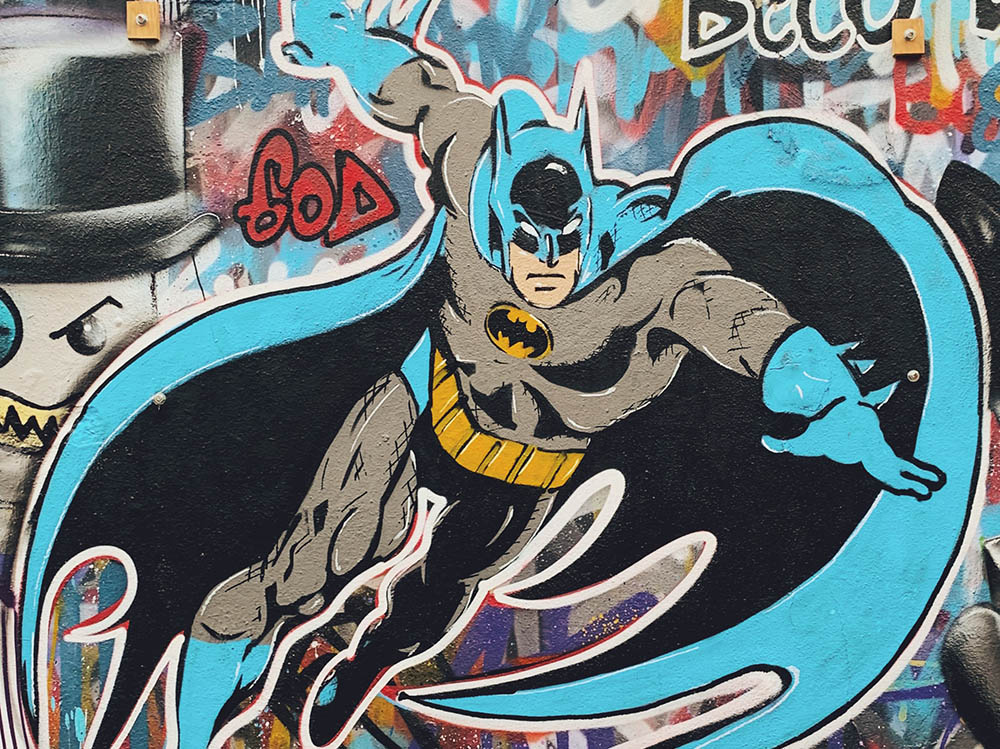
The comic book character Batman is seen depicted in street graffiti. (Pixabay/Luiz Gomes)
Pope Francis has been criticized by some people, including some cardinals, for talking too much about God's mercy and not enough about God's justice.
They have especially criticized him for his openness to the possibility of divorced and remarried Catholics taking Communion. His critics say these people broke God's law and should suffer the consequences. Francis has also been criticized for being welcoming to gays and for not cracking down on dissident theologians.
Most of us side with Francis when it comes to being merciful to ourselves and our friends. But for others, we want a God who punishes wrongdoing. When I watch the news on TV, for example, I see a lot of people I want God to punish.
Deep in our hearts, we want Batman for God, someone who will beat up our enemies and punish evildoers. We really don't respect a God who is a wimp, who turns the other cheek. We want a God who gets mad and gets even. We want a kick-ass God.
We want this, of course, for other people, not for ourselves. For ourselves, there are always extenuating circumstances. Sins are mistakes, lies are misstatements, infidelity is independence, and irresponsibility is being free. We easily argue that "everyone does it" and that the end justifies the means.
For ourselves, we want a God who is merciful and understanding, but for others we want a God who punishes.
If I were God, I would be zapping bad guys with lightning all day long. The God of Jesus does not do this.
The passage from Matthew's Gospel read in Catholic churches on July 23 challenges our concept of God. Jesus tells a story, an allegory, about a farmer who sowed good seed and then found that weeds, sowed by an enemy, were growing along with the wheat. The farmer tells his servants to leave the weeds and let them grow with the wheat.
This sounds like a dumb idea. Anyone who gardens knows that you do not let weeds grow along with your flowers and tomatoes. Pull them up or spray them with weed killer. The farmers listening to Jesus must have been surprised by his story. They probably thought, "This guy is clearly a carpenter, not a farmer."
In his parables, Jesus often says something surprising or shocking when he wants to make a point. In this parable, Jesus wants to emphasize that God does not act like we think he should. He does not act like we would act if we were God.
If I were God, I would be zapping bad guys with lightning all day long. The God of Jesus does not do this.
Scripture scholars tell us that after the ascension of Jesus, some of the early Christians felt the church should be only for good people. These early Christians, like Francis' opponents, believed that those who were weak or sinners or had a different theology should be thrown out of the community, excommunicated.
Matthew is telling them in this parable that they must leave such judgments to God. Or as Francis said, regarding LGBTQ Catholics, "Who am I to judge?"
We must have patience. Justice will come, a day of reckoning will come, but it must not be rushed.
It is not the job of Christians, it is not our job, to decide who are the wheat and who are the weeds, who are the good guys and who are the bad guys; that is for God to decide.
Advertisement
As Francis noted in his July 23 homily, "In human history, as in each of our lives, there is a mixture of light and shadows, love and selfishness. Good and evil are even intertwined to the point of seeming inseparable."
But we want to destroy evil. We want to pull up the weeds.
"This attitude comes from good intentions, but is impulsive and even aggressive," explained Francis. "They delude themselves into thinking that they can uproot evil by their own efforts in order to make things pure. Indeed, we frequently see the temptation of seeking to bring about a 'pure society' or a 'pure church,' whereas in working to reach this purity, we risk being impatient, intransigent, even violent toward those who have fallen into error."
The Christian community must be big enough for all, sinners and saints, the strong and the weak, the knowledgeable and the confused, liberals and conservatives, gays and straights, Republicans and Democrats.
This also applies to our political lives.
In "Forming Consciences for Faithful Citizenship," advice to American Catholics on political issues updated every presidential election cycle, U.S. Catholic bishops argue against a partisanship that demonizes our opponents. It also challenges a culture that turns to violence to solve problems, whether through abortion, euthanasia, the death penalty, an "imprudent resort to war" or mob violence.
When Francis said that good and evil are so intertwined as to be inseparable, he meant that we need to see the world as it is.
"This realistic approach helps us to view history without ideologies, without sterile optimism or poisonous pessimism. Christians, motivated by the hope of God, are not pessimists; nor do they naively live in a fairy tale, pretending not to see evil and saying that 'all is well.' No, Christians are realists: They know that there are wheat and weeds in the world."
In our personal and political lives, we need to pray for the grace to be just and kind, to trust in God's mercy not only for ourselves but for others. To forgive as we are forgiven. To treat one another as our Father treats us, not like Batman.





